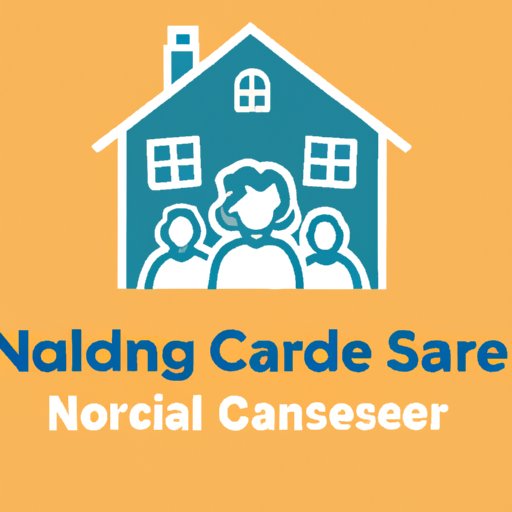Introduction
Paying for nursing home care can be a daunting prospect for many families. With the cost of care rising every year, it is important to understand all of the options available when it comes to financing long-term care. This article will explore the various ways to pay for nursing home care, including financial assistance programs, long-term care insurance, Medicaid and Medicare coverage, reverse mortgages, veterans benefits, and more. We will also discuss strategies for paying for nursing home care out-of-pocket, and compare the costs of assisted living vs. nursing home care.
Exploring Financial Assistance Programs for Nursing Home Care
There are several types of financial assistance programs available to help cover the cost of nursing home care. These programs are typically funded by state and federal government agencies, as well as private organizations. Some of the most common programs include Medicaid, Supplemental Security Income (SSI), Veterans Benefits, and charitable organizations. Each program has its own eligibility requirements, so it is important to research all of your options before deciding which one is right for you.
When applying for any of these programs, you will need to provide detailed information about your financial situation, including income, assets, debts, and other expenses. You may also need to provide proof of residency or citizenship status. Depending on the program, you may also need to provide medical documentation, such as a doctor’s note or a prescription for long-term care. It is important to read the eligibility requirements carefully and make sure you have all of the necessary documents ready before submitting your application.
An Overview of Long-Term Care Insurance and How it Covers Nursing Home Care
Long-term care insurance (LTC) is an insurance policy that helps pay for expenses associated with long-term care services, such as nursing home care. It is important to note that LTC is not a replacement for health insurance; it is designed to supplement existing coverage. Most policies have a waiting period before they begin to pay benefits, so it is important to factor this into your decision when purchasing a policy.
The benefits of having LTC insurance are numerous. For example, most policies will cover some or all of the costs associated with a nursing home stay, including room and board, medications, and other services. Additionally, LTC insurance can help protect your assets in the event of a long-term illness or disability. Finally, many policies offer additional benefits, such as respite care or home health care.
When considering whether or not to purchase LTC insurance, it is important to consider the cost of the policy, as well as the coverage limits. Policies vary in terms of what they cover and how much they cost, so it is important to do your research and make sure the policy you choose meets your needs.
Understanding Medicaid and Medicare Coverage for Nursing Home Care
Medicaid and Medicare are two government-funded programs that can help pay for nursing home care. Medicaid is a public health insurance program that covers certain individuals and families who meet certain eligibility requirements. Medicare is a federal health insurance program that pays for certain medical services for people over the age of 65. Both programs have specific guidelines regarding who is eligible for coverage and what services are covered.
In order for Medicaid to cover nursing home care, the individual must meet certain financial and medical criteria. Generally, individuals must have limited income and assets in order to qualify. Additionally, they must require a certain level of care that can only be provided in a nursing home setting. Medicare, on the other hand, will typically only cover short-term stays in a skilled nursing facility.

How to Use Reverse Mortgages to Pay for Nursing Home Care
A reverse mortgage is a loan that allows homeowners to access the equity in their home without having to make monthly payments. The loan is repaid when the homeowner passes away or moves out of the home. Reverse mortgages can be used to pay for nursing home care, but there are certain restrictions that must be met in order for the loan to be approved. Generally, the borrower must be at least 62 years old and must have enough equity in their home to cover the loan amount.
Reverse mortgages can be a good option for those who want to remain in their home for as long as possible, but need help covering the costs of long-term care. However, it is important to remember that a reverse mortgage is a loan, so it must be repaid eventually. Additionally, there are fees associated with taking out a reverse mortgage, so it is important to weigh the costs and benefits before making a decision.

The Role of Veterans Benefits in Paying for Nursing Home Care
Veterans who served in the military may be eligible for a variety of benefits that can help pay for nursing home care. The Department of Veterans Affairs (VA) offers several programs that provide assistance to veterans who need long-term care. These programs provide financial assistance, as well as access to nursing home care and other services.
In order to qualify for VA benefits, veterans must meet certain eligibility requirements. Generally, veterans must have served in the military for a certain length of time and must have a service-related disability. Additionally, they must meet certain financial requirements in order to receive benefits. It is important to note that not all veterans will qualify for VA benefits, so it is important to do your research and make sure you meet the necessary criteria.
Strategies for Paying for Nursing Home Care Out-of-Pocket
For those who do not qualify for financial assistance programs, long-term care insurance, or veterans benefits, it may be necessary to pay for nursing home care out-of-pocket. There are several payment options available, including private pay, long-term care savings accounts, and long-term care loans. It is important to research all of your options and decide which one is best for your situation.
When paying for nursing home care out-of-pocket, it is important to look for ways to reduce costs. For example, many nursing homes offer discounts for long-term stays or for those who pay in full up front. Additionally, some nursing homes offer sliding scale rates based on income. It is also important to remember that there may be other services available to help offset the cost of care, such as home health care or adult day care.

Comparing the Costs of Assisted Living vs. Nursing Home Care
When deciding between assisted living and nursing home care, it is important to consider the cost of each option. Assisted living facilities typically cost less than nursing homes, but they may also provide fewer services. Nursing homes are typically more expensive, but they offer more comprehensive care and services. Ultimately, the decision should be based on the individual’s needs and budget.
Assisted living facilities provide a variety of services, including meals, housekeeping, transportation, and recreational activities. Additionally, many facilities offer specialized programs, such as memory care or physical therapy. Nursing homes, on the other hand, offer a higher level of care, including 24-hour supervision, medical care, and rehabilitative services.
Conclusion
Paying for nursing home care can be a complex process, but there are several options available for those who need help covering the cost. Financial assistance programs, long-term care insurance, Medicaid and Medicare, reverse mortgages, veterans benefits, and out-of-pocket payments are all viable options. It is important to research all of your options and make sure you understand the eligibility requirements and coverage limits of each before making a decision. Additionally, it is important to compare the costs of assisted living vs. nursing home care in order to make the best decision for your situation.
If you need more information or assistance with paying for nursing home care, there are a variety of resources available. Your local Area Agency on Aging can provide helpful information about financial assistance programs, long-term care insurance, and other services. Additionally, your state’s Department of Health and Human Services can provide information about Medicaid and Medicare coverage. Finally, it is always a good idea to speak with a financial advisor or elder law attorney to ensure you are making the best decisions for your situation.
(Note: Is this article not meeting your expectations? Do you have knowledge or insights to share? Unlock new opportunities and expand your reach by joining our authors team. Click Registration to join us and share your expertise with our readers.)
